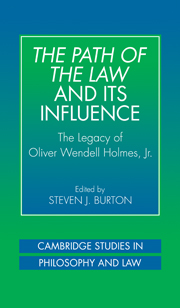Book contents
- Frontmatter
- Contents
- Acknowledgments
- List of Contributors
- The Path of the Law and Its Influence
- Introduction
- 1 Law as a Vocation: Holmes and the Lawyer's Path
- 2 The Bad Man and the Good Lawyer
- 3 Why Practice Needs Ethical Theory: Particularism, Principle, and Bad Behavior
- 4 Theories, Anti-Theories, and Norms: Comment on Nussbaum
- 5 Traversing Holmes's Path toward a Jurisprudence of Logical Form
- 6 Holmes on the Logic of the Law
- 7 Holmes versus Hart: The Bad Man in Legal Theory
- 8 The Bad Man and the Internal Point of View
- 9 Oliver Wendell Holmes, Jr., and William James: The Bad Man and the Moral Life
- 10 Emerson and Holmes: Serene Skeptics
- 11 The Path Dependence of the Law
- 12 Changing the Path of the Law
- 13 Holmes, Economics, and Classical Realism
- 14 Comment on Brian Leiter's “Holmes, Economics, and Classical Realism”
- Appendix: The Path of the Law
- Index
1 - Law as a Vocation: Holmes and the Lawyer's Path
Published online by Cambridge University Press: 22 October 2009
- Frontmatter
- Contents
- Acknowledgments
- List of Contributors
- The Path of the Law and Its Influence
- Introduction
- 1 Law as a Vocation: Holmes and the Lawyer's Path
- 2 The Bad Man and the Good Lawyer
- 3 Why Practice Needs Ethical Theory: Particularism, Principle, and Bad Behavior
- 4 Theories, Anti-Theories, and Norms: Comment on Nussbaum
- 5 Traversing Holmes's Path toward a Jurisprudence of Logical Form
- 6 Holmes on the Logic of the Law
- 7 Holmes versus Hart: The Bad Man in Legal Theory
- 8 The Bad Man and the Internal Point of View
- 9 Oliver Wendell Holmes, Jr., and William James: The Bad Man and the Moral Life
- 10 Emerson and Holmes: Serene Skeptics
- 11 The Path Dependence of the Law
- 12 Changing the Path of the Law
- 13 Holmes, Economics, and Classical Realism
- 14 Comment on Brian Leiter's “Holmes, Economics, and Classical Realism”
- Appendix: The Path of the Law
- Index
Summary
In Louisa May Alcott's Eight Cousins, first published in 1875, a young woman called Rose is being given a conventional girl's upbringing by her aunts, in a dark and stuffy old mausoleum of a house. Then Uncle Alec becomes Rose's new guardian. He strides into the house, throws open the curtains and the windows, and hustles his ward into the outdoors. He throws out her old confining clothes and buys her new ones, changes her diet, and, with his vigorous scientific intellect, begins helping her to clear her mind of received opinions. With the very first sentence of The Path of the Law – “When we study law we are not studying a mystery but a well-known profession” – we know Uncle Alec has arrived and that the old Victorian mansion will never be the same again.
The Nineteenth-Century Vocational Address
Holmes's speech is all the more visibly iconoclastic because it fits into a familiar nineteenth-century form. The lawyers of Victorian America cherished the vocational address. At law school commencements, gatherings of the bar, or memorial services for colleagues, the lions of bench and bar improved the occasion with speeches on the lawyer's calling and his duty to that calling. Alien though these hundreds of orations are to the modern ear, repellent at times in their self-importance and hypocrisy, they reveal something admirable, too: a profession struggling to span the abyss between its high-sounding ideals and what so often seem its dull, trivial, and even sordid quotidian practices, to express an idea of law as a calling that could lead a man to honor, social usefulness, and self-respect.
- Type
- Chapter
- Information
- The Path of the Law and its InfluenceThe Legacy of Oliver Wendell Holmes, Jr, pp. 7 - 32Publisher: Cambridge University PressPrint publication year: 2000

